
Musical theatre is a form of theatrical performance that combines songs, spoken dialogue, acting and dance. The story and emotional content of a musical – humor, pathos, love, anger – are communicated through words, music, movement and technical aspects of the entertainment as an integrated whole. Although musical theatre overlaps with other theatrical forms like opera and dance, it may be distinguished by the equal importance given to the music as compared with the dialogue, movement and other elements. Since the early 20th century, musical theatre stage works have generally been called, simply, musicals.

Otto Abels Harbach, born Otto Abels Hauerbach was an American lyricist and librettist of nearly 50 musical comedies and operettas. Harbach collaborated as lyricist or librettist with many of the leading Broadway composers of the early 20th century, including Jerome Kern, Louis Hirsch, Herbert Stothart, Vincent Youmans, George Gershwin, and Sigmund Romberg. Harbach believed that music, lyrics, and story should be closely connected, and, as Oscar Hammerstein II's mentor, he encouraged Hammerstein to write musicals in this manner. Harbach is considered one of the first great Broadway lyricists, and he helped raise the status of the lyricist in an age more concerned with music, spectacle, and stars. Some of his more famous lyrics are "Smoke Gets in Your Eyes", "Indian Love Call" and "Cuddle up a Little Closer, Lovey Mine".
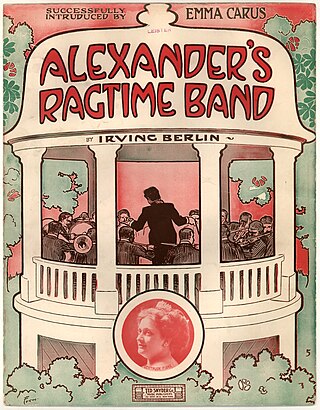
"Alexander's Ragtime Band" is a Tin Pan Alley song by American composer Irving Berlin released in 1911; it is often inaccurately cited as his first global hit. Despite its title, the song is a march as opposed to a rag and contains little syncopation. The song is a narrative sequel to Berlin's earlier 1910 composition "Alexander and His Clarinet". This earlier composition recounts the reconciliation between an African-American musician named Alexander Adams and his flame Eliza Johnson as well as highlights Alexander's innovative musical style. Berlin's friend Jack Alexander, a cornet-playing African-American bandleader, inspired the title character.

George Gard "Buddy" DeSylva was an American songwriter, film producer and record executive. He wrote or co-wrote many popular songs and, along with Johnny Mercer and Glenn Wallichs, he co-founded Capitol Records.
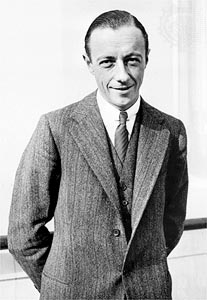
Vincent Millie Youmans was an American Broadway composer and producer.
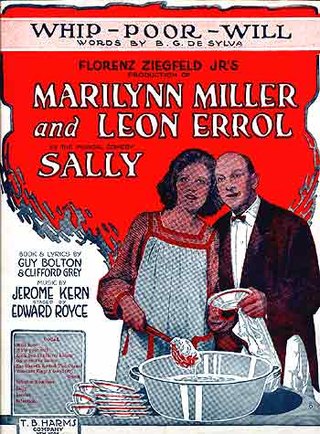
Sally is a musical comedy with music by Jerome Kern, lyrics by Clifford Grey and book by Guy Bolton, with additional lyrics by Buddy De Sylva, Anne Caldwell and P. G. Wodehouse. The plot hinges on a mistaken identity: Sally, a waif, is a dishwasher at the Alley Inn. She poses as a famous foreign ballerina and rises to fame through joining the Ziegfeld Follies. There is a rags to riches story, a ballet as a centrepiece, and a wedding as a finale. "Look for the Silver Lining" continues to be one of Kern's most familiar songs. The song is lampooned by another song, "Look for a Sky of Blue," in Rick Besoyan's satirical 1959 musical Little Mary Sunshine.

William Mercer Cook, better known as Will Marion Cook, was an American composer, violinist, and choral director. Cook was a student of Antonín Dvořák. In 1919 he took his New York Syncopated Orchestra to England for a command performance for King George V of the United Kingdom, and tour. Cook is probably best known for his popular songs and landmark Broadway musicals, featuring African-American creators, producers, and casts, such as Clorindy, or The Origin of the Cake Walk (1898) and In Dahomey (1903). The latter toured for four years, including in the United Kingdom and United States.

Bloomer Girl is a 1944 Broadway musical with music by Harold Arlen, lyrics by E.Y. Harburg, and a book by Sig Herzig and Fred Saidy, based on an unpublished play by writer Daniel Lewis James and his wife Lilith. The plot concerns independent Evelina Applegate, a hoop skirt manufacturer's daughter who defies her father by rejecting hoopskirts and embracing comfortable bloomers advocated by her aunt "Dolly" Bloomer, who was inspired by the women's rights advocate Amelia Bloomer. The American Civil War is looming, and abolitionist Evelina refuses to marry suitor Jeff Calhoun until he frees his slave, Pompey.

Harry Lawrence Freeman was an American neoromantic opera composer, conductor, impresario and teacher. He was the first African-American to write an opera that was successfully produced. Freeman founded the Freeman School of Music and the Freeman School of Grand Opera, as well as several short-lived opera companies which gave first performances of his own compositions. During his life, he was known as "the black Wagner."

What's Up? is a musical notable as the first Broadway stage collaboration by Lerner and Loewe, with book by Arthur Pierson and Alan Jay Lerner, lyrics by Lerner, and music by Frederick Loewe.

Bravo Giovanni is a musical with a book by A. J. Russell, lyrics by Ronny Graham, and music by Milton Schafer. It is based upon Howard Shaw's 1959 novel, The Crime of Giovanni Venturi. The musical was conceived as a vehicle for opera star Cesare Siepi, and the story concerned a family-owned Italian restaurant's efforts to compete with a restaurant chain.

Robinson Crusoe, Jr. is a musical with a book by Edgar Smith, lyrics by Harold R. Atteridge, and music by Sigmund Romberg and James Hanley.
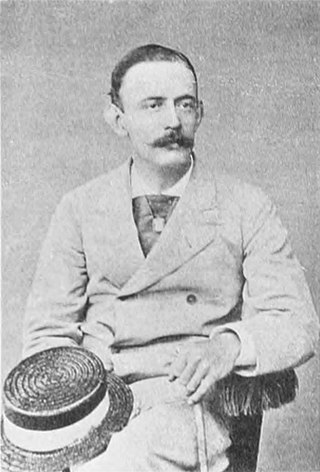
John Cheever Goodwin was an American musical theatre librettist, lyricist and producer. Goodwin was born in Boston and graduated from Harvard University. He began a career in journalism before turning to writing for the stage. Early in his theatrical career he worked for Alice Oates, acting in her company and translating French opera bouffe into English for performance by her company. He often worked with composers Edward E. Rice and Woolson Morse. Goodwin was one of the earliest American writers dedicated to musical theatre librettos and lyrics. His first successful libretto was Evangeline in 1874, and his last new work was produced in 1903.
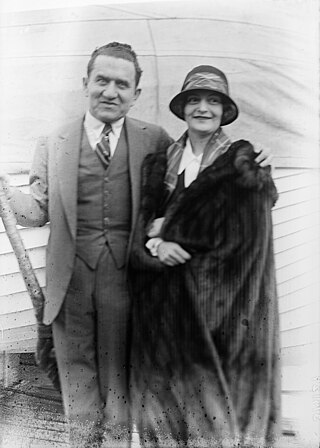
Archibald Selwyn was an American play broker, theater owner and stage producer who had many Broadway successes. He and his brother Edgar Selwyn were partners. They were among the founders of Goldwyn Pictures, later to be merged into MGM.

Jay Velie was an American actor and singer; he appeared in many Broadway shows during a career that spanned more than fifty years. He also appeared in a few film shorts.

Make It Snappy was a musical revue that ran for 96 performances at the Winter Garden Theatre in the 1922–23 Broadway season. It ran from 13 April to 1 July 1922. It starred Eddie Cantor, who introduced the hit songs "Yes! We Have No Bananas" and "The Sheik of Araby".
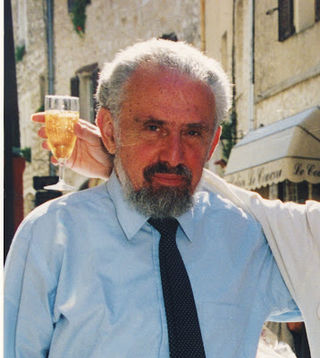
Gerald Martin Bordman was an American theatre historian, best known for authoring the reference volume The American Musical Theatre, first published in 1978. In reviewing an updated version of American Musical Theatre in 2011, Playbill wrote that the book had "altered the scope of American musical theatre history" and "remained the only book of its kind, and an invaluable one."

Development of musical theatre refers to the historical development of theatrical performance combined with music that culminated in the integrated form of modern musical theatre that combines songs, spoken dialogue, acting and dance. Although music has been a part of dramatic presentations since ancient times, modern Western musical theatre developed from several lines of antecedents that evolved over several centuries through the 18th century when the Ballad Opera and pantomime emerged in England and its colonies as the most popular forms of musical entertainment.
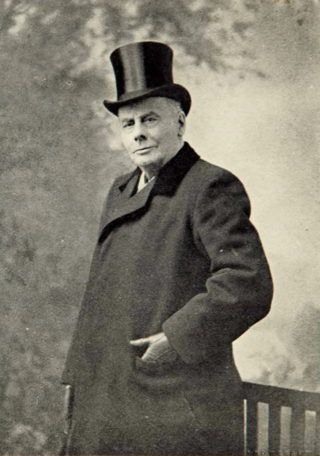
Henry de Grey Warter, better known under the stage name Richard Barker, was a British actor, stage manager and stage director. He stage managed many of Gilbert and Sullivan's comic operas and other productions of the D'Oyly Carte Opera Company, and directed some of them, and in the 1890s directed musicals in New York as well as London.

Red, White and Maddox is a satirical musical revue written by Jay Broad and Don Tucker. The play debuted in Atlanta in October 1968 and later had a 41-performance run on Broadway from January 26 to March 1, 1969. The play was conceived by Broad, who at the time was the director of the Theatre Atlanta theatrical company. Modeled as a fictional biography of Georgia Governor Lester Maddox, the play is split into two acts. The first act chronicles Maddox's foray into politics as a firebrand segregationist, culminating in him becoming governor of the state. The second act, set in the future, details Maddox becoming president of the United States.


















